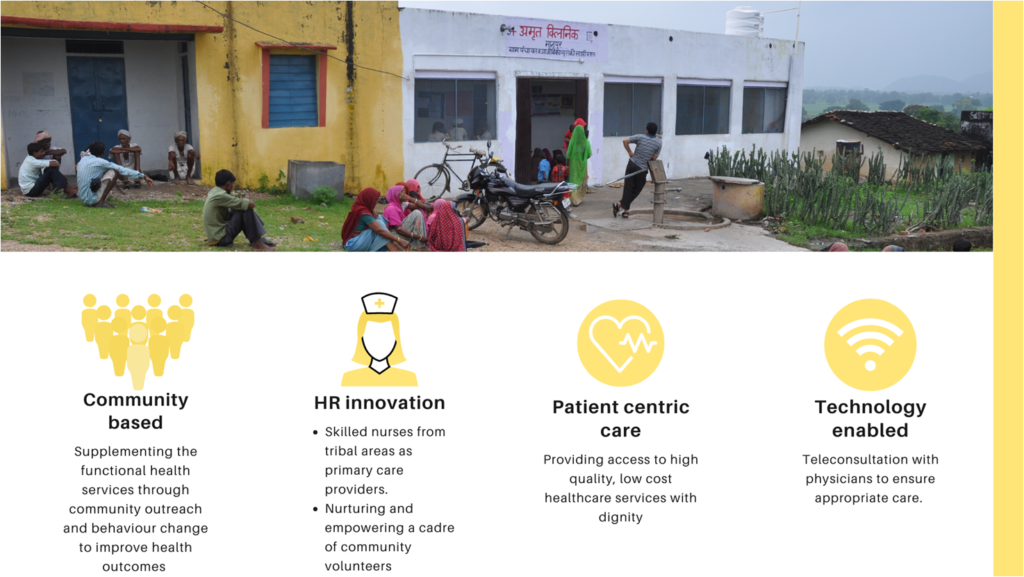Realizing the need for accessible, migrant-friendly, and low cost primary health care services in underserved areas, we have tested the proof of concept for running AMRIT Clinics in 6 remote under-served communities of South Rajasthan. In these areas, public systems have limited reach, and the illness load is high.
AMRIT Clinics aim to provide low cost, high quality health care with dignity to the remote, rural, and underserved populations. The model consists of a network of 6 primary care clinics, each serving a population of approximately 90,000 in Southern Rajasthan. The clinic is set up in a community building following a contract with the local self-government. Three nurses (women) provide clinical care and outreach care to the surrounding dispersed populations. A physician visits the clinics once each week and is available for tele-consultation 24 hrs a day.
The clinics provide consultation, administer basic laboratory tests, and provide treatment. They also provide safe childbirth services and manage emergencies 24X7. Outreach services include antenatal care, postnatal care of mothers and newborns, follow-up of chronic patients, and community education. Social contracts with private hospitals enable referral care. Patients pay a small user-fees for clinical services.
What is Distinctive about AMRIT Clinics ?

In response to the challenge of delivering quality primary healthcare, where ensuring regular availability of skilled providers is difficult, alternate solutions — telemedicine and services through community health workers — have often been implemented. At the time of conceptualising AMRIT Clinics, we considered these but found them to have some inherent limitations.
Telemedicine Solutions: This solution addresses the problem by having a remote physician consulting with the patients in such areas. Such a solution however does not address the need for managing emergencies, providing services such as safe birth, nor preventive and promotive services, such as immunization and ANC.
Training of Community Health Workers: Community health workers, when adequately skilled and supervised, have been shown to improve specific health outcomes such as neonatal mortality. However, the healthcare needs of the families extend much beyond what community health workers can provide. So while CHWs can supplement the functional health services, they cannot substitute the same.
We believe that nurses, when adequately skilled and supported, can address the challenge of delivering high quality primary health care in such areas. They are professionally trained and skilled as opposed to CHWs, and are much more adaptable to live and work in underserved areas as compared to physicians. Intensive training, on-job support, and use of appropriate technology allows them to deliver high quality care.
AMRIT Clinic is a practice innovation that judiciously combines three distinct innovations — human resource innovations, partnership innovations, and technology innovations — to meet the need for low cost, high quality services for healthcare in remote, rural and underserved areas.
HR Innovation: Most primary care systems rely on physicians or on community health volunteers. While physicians are rarely available to live and work in remote and rural areas, community health volunteers have limitations in their ability to function independently and in the range of services they can provide.
In AMRIT Clinics, Skilled Nurses are the prime care providers and primary care managers. There is a downward integration with community volunteers and an upward integration with a Family Physician. Nurses are more available to work in remote areas, and they have the basic education and skills to provide primary curative care provided they are skilled and supported.
Partnership innovation: Many primary care systems are not well utilized because of the weak linkages with higher levels of care. AMRIT Clinics forge social contracts with private hospitals to provide near free referral care. This has led to several lives saved, increased confidence of the families in primary care, and fulfilled social obligations of the private sector. The Clinics also forge contracts with the public system to enable targeting of health entitlements to families, such as for free diagnostics and conditional cash transfers.
Technology innovations: Telemedicine and other technology based solutions often aim to substitute the presence of skilled providers. AMRIT Clinics use technology as an enabler to allow nurses to provide high quality care, rather than as substitutes. The Clinics use low cost, appropriate technology to ensure reduced needs for unnecessary referrals.
